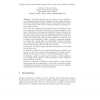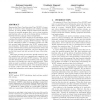188 search results - page 22 / 38 » Back to the Complexity of Universal Programs |
C5
2008
IEEE
14 years 1 months ago
2008
IEEE
End-user scripting languages are relatively easy to learn, but have limited expressive power. Tile-based scripting systems are particularly accessible to beginners, but usually ar...
DAGSTUHL
1996
13 years 8 months ago
1996
As partial evaluation gets more mature, it is now possible to use this program transformation technique to tackle realistic languages and real-size application programs. However, t...
CASES
2003
ACM
14 years 20 days ago
2003
ACM
Knowing the Worst-Case Execution Time (WCET) of a program is necessary when designing and verifying real-time systems. A correct WCET analysis method must take into account the po...
IUI
2004
ACM
14 years 25 days ago
2004
ACM
Technical support procedures are typically very complex. Users often have trouble following printed instructions describing how to perform these procedures, and these instructions...
BMCBI
2005
13 years 7 months ago
2005
Background: Exhaustive methods of sequence alignment are accurate but slow, whereas heuristic approaches run quickly, but their complexity makes them more difficult to implement. ...


